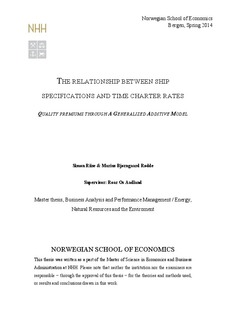The relationship between ship specifications and time charter rates : quality premiums through a generalized additive model
Abstract
Nonlinear semi-parametric modeling of freight rates in the dry bulk market has gained
increased recognition, although it has not been implemented extensively in previous
studies. By allowing the data itself to dictate the functional form of our model we
seek to decompose the physical time charter rate according to a combination of macro
- and microeconomic variables. Our main goal is to identify quality related aspects of
rate determinants and the possible existence of a quality premium. A spline
interpolation technique is applied to exclude time–related modifications to the market
index along with actual contract fixtures from 2001 to 2014 across the three main dry
bulk segments. Supporting previous literature, we identify a clear non-linearity
between variables and support for quality segmentation with respect to age and size.
Furthermore Japan has increased its position as a provider of quality tonnage and
there has been a shift in fuel efficiency, measured as consumption per ton-miles, over
time. Contractual specification on cost allocations between shipowner and charterer
suggest that the charterer obtains any possible quality related profits, showing
evidence of split incentive barriers. In general we find that there has been a shift in
market dynamics in time periods before and after 2008.
